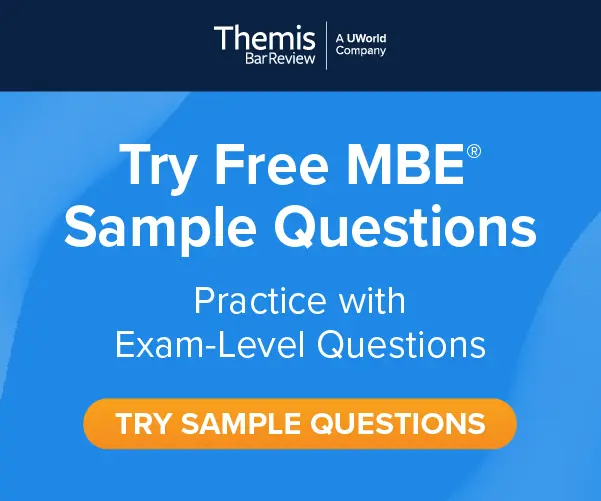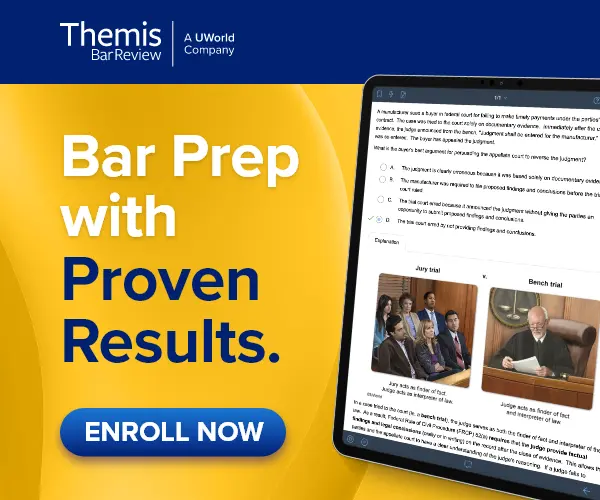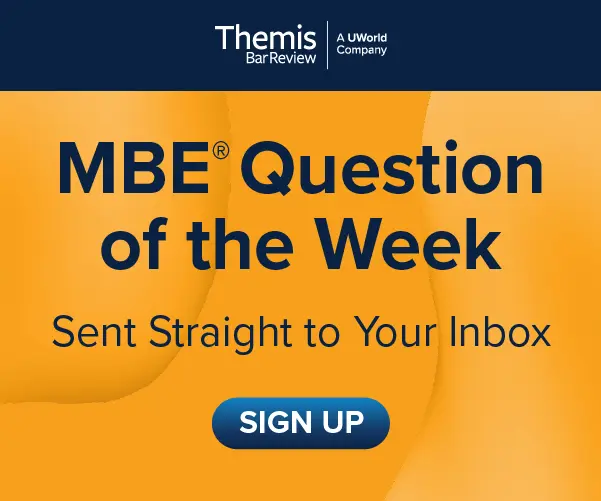A strong Multistate Bar Examination (MBE) score is essential for passing the bar exam in most jurisdictions since it’s weighted at 50% of your overall Uniform Bar Examination (UBE®) score. Success on the MBE requires a strategic study plan, a strong grasp of blackletter law, and the right study materials. Mastering these fundamental legal principles will give you a solid advantage on exam day.
How to Study for the MBE
Creating and following a study schedule is necessary to prepare for the MBE. A study schedule can help you optimize your preparations while accounting for your commitments, exam timelines, and the vast breadth of information to cover. With a solid study plan, you can devise an effective schedule that works best for you.
Break your study sessions into manageable goals so your exam will feel like practice. Our MBE QBank can help you identify your weaknesses and turn them into strengths, saving you time.
- Full-time students: Study 40-50 hours per week for 8-10 weeks, covering one MBE subject weekly while reviewing past topics.
- Part-time students: Start 4-6 months ahead, studying 16-25 hours per week.
Learn more about the MBE exam’s format and subjects to help you create a study plan that will maximize your performance.
Improve Your Study Environment
A well-organized, clutter-free study space enhances focus, efficiency, and persistence, so tidy up before you begin. Research shows that changing study locations can also improve retention and concentration. Whether moving to another room or heading outside, your brain forms stronger connections with the material by associating it with different environments, reinforcing learning.
Concentrate on Heavily Tested Subjects and Topics
Developing a holistic and balanced understanding of the law should be a guiding principle of any legal professional. However, when it comes to passing the MBE, concentrate the bulk of your time studying the most heavily tested subjects and topics. If you thoroughly understand a heavily tested subject and consistently do well in practice, calibrate your study plan to focus on less understood subjects.
Memorize the Rules
The MBE requires a great deal of memorization. The sooner you begin memorizing the blackletter law, the easier the study process will be.
Practice with Purpose
Effective MBE prep requires intentional and diverse practice, not just passive review. Simulate exam conditions and use tutor and timed modes in our QBank. Our MBE QBank provides thousands of NCBE-licensed and expert-curated questions at MBE-level difficulty. Built-in performance analytics help you focus on weak areas, while detailed explanations for every answer choice enhance understanding and retention.
Use Flashcards and Mnemonics
Flashcards and mnemonics are time-tested, active-learning study tools. Research shows that students who use mnemonics recall significantly more information — even months later — than those using passive methods. You can create unlimited custom MBE flashcards with information directly from our QBank and incorporate mnemonics, illustrations, and other key content. Reinforce concepts with diagrams, charts, and active recall techniques.
Track Your Progress
Tracking your progress will help you improve your performance. Regular tracking keeps you focused, helps you adjust goals, and turns weaknesses into strengths. For example, if you're struggling with Real Property but confident in Constitutional Law, analyze your approach and apply successful strategies to weaker areas for better retention.
Understand the Logic Behind Correct Answers
A single word or phrase in an MBE question can be the difference between a correct or incorrect answer. Our detailed explanations note key legal nuances between answer choices. This practice sharpens your ability to recognize subtle distinctions so you can narrow down choices and eliminate clearly incorrect options before selecting the best answer on the exam. Remember: There’s no penalty for wrong answers on the exam, so never leave a question blank.
Take Breaks
Time is valuable, but skipping breaks can hurt your focus. Research shows that taking regular breaks — like 15 minutes every 90 minutes — enhances productivity. If stepping away feels stressful, try passive review, like flipping through flashcards while waiting for dinner.







